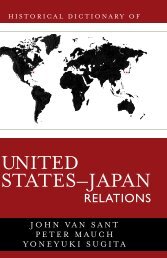Confucian Political Theory in the Face of the Future1 Mon-Han Tsai
Confucian Political Theory in the Face of the Future1 Mon-Han Tsai
Confucian Political Theory in the Face of the Future1 Mon-Han Tsai
Create successful ePaper yourself
Turn your PDF publications into a flip-book with our unique Google optimized e-Paper software.
much shorter historical memory. Second, <strong>the</strong> Ch<strong>in</strong>ese failure to comply with <strong>the</strong><br />
practices <strong>of</strong> Western liberal democracy has less to do with rival values or ideology; it is<br />
primarily down to what John Dunn (2000 and 2005) has so poignantly analysed <strong>the</strong> gap<br />
between hope and realis<strong>in</strong>g it politically, or his word, ‘a misnomer’ (2005, p155). What’s<br />
more distress<strong>in</strong>g is that we do not even remotely know why. Third, while <strong>Confucian</strong>ism<br />
rema<strong>in</strong>s resilient <strong>in</strong> contemporary Japan, it has lost its <strong>in</strong>tellectual vigour and political<br />
ambition. On <strong>the</strong> contrary, <strong>Confucian</strong>ism has once aga<strong>in</strong> become very active and<br />
<strong>in</strong>creas<strong>in</strong>gly vocal <strong>in</strong> Ch<strong>in</strong>a and its popularity has recently soared to a dazzl<strong>in</strong>g height<br />
never witnessed before <strong>in</strong> modern Ch<strong>in</strong>a. So Ch<strong>in</strong>a is now unmistakably <strong>the</strong> scene <strong>of</strong><br />
action. Last, if not most pert<strong>in</strong>ently, <strong>the</strong> spectacular rise <strong>of</strong> Ch<strong>in</strong>a <strong>in</strong> <strong>the</strong> last fifteen<br />
years or so s<strong>in</strong>ce Deng Xiaop<strong>in</strong>g’s well-publicised (and <strong>in</strong> retrospect, most conducive)<br />
Sou<strong>the</strong>rn Visit has prioritised <strong>the</strong> Ch<strong>in</strong>ese case over Japan or Korea let alone Taiwan or<br />
Vietnam. It would def<strong>in</strong>itely help us to see if <strong>the</strong> rise <strong>of</strong> Ch<strong>in</strong>a could <strong>in</strong>stigate <strong>the</strong> clash<br />
<strong>of</strong> civilisations <strong>in</strong> <strong>the</strong> 21 st century as so <strong>of</strong>ten feared. And if not, what it would possibly<br />
mean to <strong>the</strong> world, a merrier outcome or less enriched and diverse human political<br />
imag<strong>in</strong>ations (Dunn, 2007, Discussion paper 2).<br />
Lost <strong>in</strong> Translation-Conflation and Dist<strong>in</strong>ction 3<br />
How did Western political <strong>the</strong>ory come to occupy such a tower<strong>in</strong>g position <strong>in</strong> East<br />
Asia and <strong>in</strong> Ch<strong>in</strong>a, especially? Why have people <strong>in</strong> East Asia become conv<strong>in</strong>ced <strong>of</strong> <strong>the</strong><br />
<strong>in</strong>tr<strong>in</strong>sic normative power <strong>of</strong> Western political <strong>the</strong>ory? The clues lie <strong>in</strong> <strong>the</strong> period<br />
between 1840-1880. Though <strong>in</strong> <strong>the</strong> 16 th and 17 th centuries, Ch<strong>in</strong>a managed to learn a lot<br />
about Europe through <strong>the</strong> Jesuit missions <strong>in</strong> Ch<strong>in</strong>a, however, by mid-18 th century, when<br />
Europe’s understand<strong>in</strong>g <strong>of</strong> <strong>the</strong> world <strong>in</strong>clud<strong>in</strong>g Ch<strong>in</strong>a had <strong>in</strong>creased dramatically, Ch<strong>in</strong>a<br />
stopped learn<strong>in</strong>g from <strong>the</strong> West altoge<strong>the</strong>r (Okamoto, 2000). Ch<strong>in</strong>a’s <strong>in</strong>terest <strong>in</strong> Europe<br />
did not recur until Ch<strong>in</strong>a was roundly defeated by <strong>the</strong> Anglo-Franco forces <strong>in</strong> <strong>the</strong> second<br />
Opium War or Arrow War (1856-1860). By <strong>the</strong>n, Ch<strong>in</strong>ese as well as Japanese 4 had not<br />
only recognised <strong>the</strong> military superiority <strong>of</strong> <strong>the</strong> West but also, along with it, <strong>the</strong> merits <strong>of</strong><br />
Western political <strong>in</strong>stitutions and ideas. Yokoi Shonan, a prom<strong>in</strong>ent <strong>Confucian</strong> activist<br />
3 For an excellent discussion on conflation and dist<strong>in</strong>ction <strong>in</strong> political notions, see Condren (1994)<br />
Chapter 1 and 2<br />
4 In 1853, Commodore Perry forced Japanese to open its door to external trade and it is known as <strong>the</strong><br />
Black Ship <strong>in</strong>cident. Before that, <strong>the</strong> majority view <strong>in</strong> Japan was <strong>in</strong> favour <strong>of</strong> expell<strong>in</strong>g barbarians<br />
(joi-ron), but after <strong>the</strong> <strong>in</strong>cident, <strong>the</strong> op<strong>in</strong>ion swiftly shifted to open<strong>in</strong>g up <strong>the</strong> country (kaikoku-ron).<br />
4













